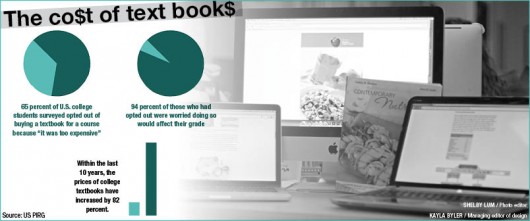Some Ohio State students and professors are speaking out about the high prices of textbooks in light of a recent study that found students are spending roughly $1,200 per year on supplies. Some publishers, though, said digital textbooks are the cheaper way to go.
The results from a survey done by U.S. PIRG — a public interest research group — about students and textbooks were released Jan. 27. The study was conducted in September and October through an anonymous multiple choice survey given on college campuses. More than 2,000 surveys were collected on 156 different college campuses in 33 states, according to the study.
The study found that 65 percent of U.S. college students had opted out of buying a textbook for a course because “it was too expensive,” while 94 percent of those who had opted out were worried doing so would affect their grade.
It also found that within the last 10 years, the prices of college textbooks have increased by 82 percent.
Meanwhile, OSU students will each spend about $1,250 on textbooks and other supplies this year, according to the OSU Student Financial Aid website.
Bryan Stewart, program associate for Ohio PIRG, said the study raises questions of what will happen next.
“The larger discussion now is what can we do to fix this … We don’t want to put the blame on faculty or campus bookstores, but instead blame the publishers as the root of the problem,” Stewart said.
Lucia Dunn, a professor of economics at OSU, agreed textbook prices are a serious financial burden for students.
“The laws of Newton haven’t changed in over 200 years and why publishing companies are changing the edition of a book every 18 months is beyond me,” Dunn said.
She said she has looked at whether the material changes every time a new edition is released, but found it doesn’t.
“Essentially, it is the exact same material as the previous edition, just literally rearranged and relocated onto different pages,” Dunn said. “The only thing that changes is the look.”
There are alternatives for students when buying new books, such as renting them, buying a used or older edition or using an open textbook.
Stewart said open textbooks are textbooks that are available online for free and never expire, and they include all the same material as a hardcopy edition of a book.
Brian Belardi, director of media relations at McGraw-Hill Education, a textbook publisher, said the company’s main financial investment goes to the development of the content that goes inside of a text itself.
“Buying the rights of the material can be expensive, but our costs stay relatively the same when it comes to producing either a print or digital edition, they just shift a little,” Belardi said.
According to Publishers Weekly, McGraw-Hill is ranked No. 8 among the world’s 60 largest book publishing companies as of July 2013.
Belardi said the price difference of a digital text versus a hardcopy text affects only the consumer.
“With a print edition, the student is paying for the printing, shipping and storage of the book so going digital is the cheaper option,” Belardi said.
Recently, three High Street textbook stores announced they are set to shut their doors. College Town, located at 1770 N. High St., closed around the beginning of the semester, and University Book Exchange, located at 10 E. 15th Ave., is set to close its store by the end of Spring Semester. Buckeye Books, located at 2060 N. High St., closed during Fall Semester.
Davon Norris, a fourth-year in accounting, said the most he has spent on one textbook was $350.
“It was for an honors tax accounting course,” Norris said. “I hated how much I had to spend and I didn’t even end up using it because there were no exams in the course, and I couldn’t return it.”
Margot Geichman, a fourth-year in hospitality management, said she is unfamiliar with open textbooks but thinks it’s a good idea.
“I always look on Amazon to see if I can find a cheaper option and I usually find one, but the idea of getting all the material for free digitally would save so much money,” Geichman said.
Elise Johnson, a second-year in biology, said she once opted out of buying a hardcopy book for a math class and instead bought an online edition for $25.
Belardi said McGraw-Hill is offering some online programs that work toward the company’s ultimate goal.
“A big part of our plan is to officially go all digital,” Belardi said. “Switching to digital textbooks would help students financially in a number of ways.”
A Student Book Exchange representative did not provide comment Tuesday.
Dunn said she will continue to try to offer her students affordable options, but thinks students themselves need to take initiative as well.
“Students need to wise up and talk to their professors about being allowed to use an older edition and professors need to be more conscientious of this,” Dunn said.



